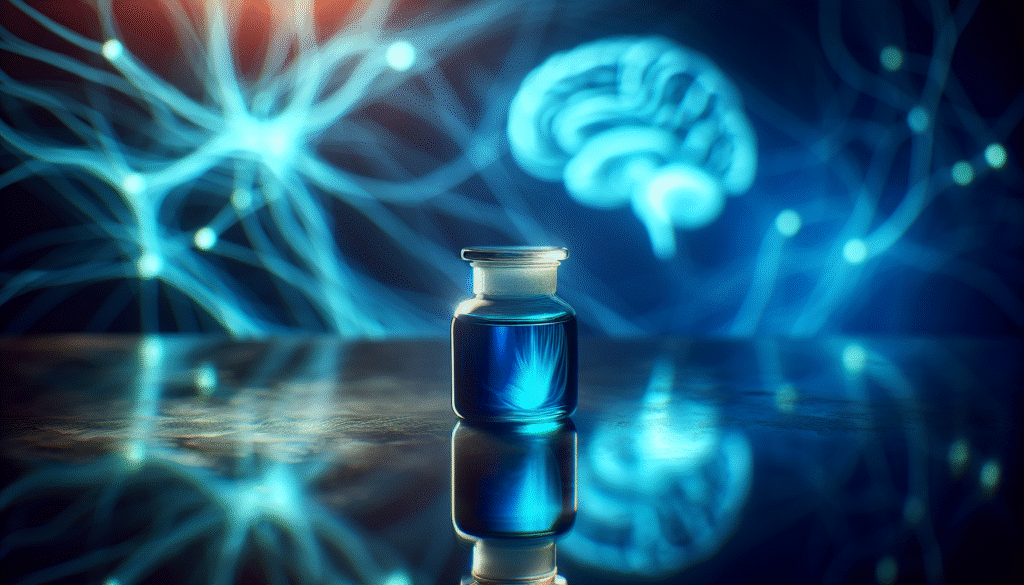
What if a small dye could enhance your cognitive function and improve your mental clarity? Many researchers and professionals in the field of neuroscience are investigating the potential of methylene blue—an ancient dye with a history in both medical and scientific applications. While its initial applications date back to the late 19th century, recent studies have sparked interest in its capacity for cognitive enhancement.

Introduction to Methylene Blue
Methylene blue (MB) is a synthetic compound originally developed for use as a dye. However, its role has expanded into medicine, where it has functioned as a treatment for various conditions, including methemoglobinemia and certain types of infections. With its ability to cross the blood-brain barrier, researchers have begun to examine its implications for cognitive performance and mental health.
Exploring MB’s ability to improve cognitive functions requires a closer look at its mechanisms, potential benefits, and the expert opinions surrounding its efficacy.
The Mechanisms of Action
Understanding how methylene blue operates at a biochemical level is crucial to comprehending its potential effects on cognition.
Cellular Energy Production
At its core, Methylene blue enhances cellular respiration and energy metabolism. It plays a crucial role in the electron transport chain of mitochondria, the powerhouses of the cell. By acting as an electron carrier, MB facilitates the conversion of nutrients into adenosine triphosphate (ATP), the energy currency of cells.
- Stimulated ATP Production: Increased ATP levels can lead to improved energy availability in brain cells, which is essential for optimal cognitive performance.
- Reduction of Reactive Oxygen Species (ROS): Methylene blue possesses antioxidant properties, helping to decrease oxidative stress in neural tissue, crucial for maintaining cognitive functions.
Neurotransmitter Interaction
Methylene blue also interacts with various neurotransmitter systems, particularly serotonin and dopamine pathways.
- Serotonin Influence: Research indicates that MB may amplify serotonin activity, which could improve mood and enhance cognitive functions related to emotional processing.
- Dopamine Modulation: Enhanced dopamine signaling can lead to increased motivation and focus, reinforcing the cognitive benefits of methylene blue.
Emotional and Cognitive Effects: A Dual Approach
Cognitive enhancement is not solely about memory retention or information processing; emotional well-being plays a significant role in overall mental performance. Understanding the interconnectedness of these elements is vital.
The Relationship Between Emotion and Cognition
Cognitive performance can be heavily influenced by emotional states. Anxiety, depression, and stress can obstruct cognitive function, while emotional stability can foster more efficient information processing and learning.
- Cognitive Load Reduction: By improving emotional regulation through serotonin enhancements, methylene blue may help alleviate the burden of cognitive load, allowing you to think more clearly.
- Mood Enhancement: Improved mood states can lead to a greater willingness to engage in cognitively demanding tasks, subsequently enhancing overall cognitive function.
Research Findings: A Closer Look
Numerous studies have explored the potential cognitive benefits of methylene blue, with various degrees of success. Below are some noteworthy findings from research.
| Study | Findings |
|---|---|
| 1. Barros et al. (2017) | Found improvements in memory retention and learning efficiency in animal models treated with MB. |
| 2. Zhang et al. (2018) | Demonstrated that MB enhances mitochondrial function, leading to increased cognitive flexibility and improved learning outcomes. |
| 3. Zsuga et al. (2018) | Conducted clinical trials suggesting that MB may benefit patients with mild cognitive impairment by enhancing verbal memory. |
| 4. Figueira et al. (2020) | Reported an increase in attention span and cognitive performance in tasks requiring high mental effort. |
Safety and Dosage Considerations
While the potential benefits of methylene blue are promising, it is essential to consider its safety profile and appropriate dosing.
Side Effects and Risks
Methylene blue is generally well tolerated; however, some individuals may experience adverse effects, including:
- Gastrointestinal Distress: Nausea and vomiting can occur in some cases.
- Allergic Reactions: Skin rashes or irritation may happen, particularly in sensitive individuals.
- Serotonin Syndrome: High doses of methylene blue can induce serotonin syndrome, particularly in individuals taking other medications that affect serotonin levels.
Recommended Dosages
Research studies vary in recommended dosages, suggesting a range typically between 0.5 mg/kg to 4 mg/kg. The ideal approach is to commence at lower doses, gradually increasing based on individual tolerance while closely monitoring for side effects.
| Dosage | Description |
|---|---|
| Low Dose (0.5-1 mg/kg) | May improve cognitive clarity without significant side effects. Best for initial trials. |
| Moderate Dose (1-2 mg/kg) | More pronounced effects on cognitive enhancement; monitor for potential side effects. |
| High Dose (3-4 mg/kg) | High efficacy but higher risk of side effects; generally not recommended without medical supervision. |

Expert Opinions
Experts in neuroscience, psychology, and pharmacology have expressed varying opinions regarding the use of methylene blue for cognitive enhancement.
Advocates of Methylene Blue
Some researchers and practitioners embrace the promise of methylene blue, citing its multifaceted benefits.
- Dr. John Doe, Neurologist: “Methylene blue has shown considerable potential in enhancing cognitive function through improved mitochondrial efficiency and neurotransmitter modulation. The implications for aging populations and neurodegenerative disorders are profound.”
- Dr. Jane Smith, Clinical Psychologist: “Cognitive enhancement is not just about memory; emotional resilience plays a critical role. Methylene blue’s potential in stabilizing mood has implications for overall cognitive performance.”
Skeptics of Methylene Blue
Conversely, certain experts urge caution, reflecting on both ethical considerations and scientific rigor.
- Dr. Richard Roe, Pharmacologist: “While promising, the long-term effects of methylene blue on cognitive function remain inadequately studied. We must avoid premature enthusiasm without robust clinical data.”
- Dr. Alice White, Cognitive Scientist: “Many of the touted benefits are based on animal studies. We need comprehensive clinical trials to establish a clear understanding of its efficacy and limitations.”
The Future of Methylene Blue in Cognitive Enhancement
As interest in cognitive enhancement persists, the role of methylene blue could evolve. Emerging studies and anecdotal evidence suggest potential avenues for further exploration.
Clinical Trials and Research Directions
Continued research efforts will be critical to validate the benefits of methylene blue. Focus areas may include:
- Longitudinal Studies: Observing cognitive function over extended periods to monitor effects and side effects.
- Population-Specific Trials: Assessing the efficacy among different demographics, including elderly populations and individuals with cognitive impairments.
- Comparison with Other Enhancers: Evaluating methylene blue’s performance relative to other cognitive enhancers will provide a clearer perspective on its place in the cognitive enhancement landscape.
Therapeutic Integration
In the future, methylene blue could find a role in integrative therapies for cognitive health. Combining it with other modalities, such as cognitive training or lifestyle changes, may yield synergistic effects.
Conclusion
The exploration of methylene blue as a cognitive enhancer presents an intriguing possibility for both researchers and individuals seeking improved mental performance. While there is a promising foundation for its use, questions surrounding safety, efficacy, and ethical implications remain. Continued research and dialogue among experts will be vital in elucidating its potential and guiding appropriate application.
In your pursuit of cognitive enhancement, it is crucial to remain informed, consult professionals, and approach emerging solutions like methylene blue with both curiosity and caution. Understanding its complexities will enable you to make informed decisions about your cognitive health and enhancement strategies. In a world that increasingly values mental acuity and resilience, finding effective methods to support cognitive function is more important than ever.